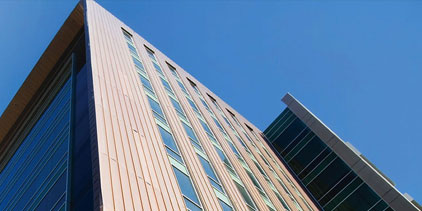In focus: Our Sustainable and Innovative Construction module
Posted on: 2021-02-22
Some of our modules run across different programmes such is the shared knowledge required across different built environment professions. Our ‘Sustainable and Innovative Construction’ module is one such example, with it taught in the first semester of our construction-related MSc programmes – Building Surveying, Construction Management and Quantity Surveying.
The module can also be studied as a standalone option through our Postgraduate Single Module Study Programme.
So, what makes the module so important at this level of study? And what is all about?
Here, module leader, Richard Cork shares an overview of the module, providing a peek into what our students learn and what work goes into making it the successful module it is…

I lead the ‘Sustainable and Innovative Construction’ module which is a core part of several UCEM MSc programmes, as well as being a popular elective and standalone module option. My students come from a wide variety of backgrounds. Many are new to the construction industry whilst others are experienced professionals in the built environment looking to formalise their training to obtain their professional institution membership. A large proportion are UK-based but we also have a lot of students in other parts of the world across numerous time zones. Some come to us soon after obtaining their first degree, but many have not studied for years and never in an online environment. Together, with my team of tutors, I aim to make everyone feel welcome.
Students learn about construction technology. So, whilst other modules cover the management, financial and legal aspects of construction, we concentrate on the component parts of buildings and how they work. From foundations to roofs and from staircase design to fire precautions, we examine all aspects of the construction process and the part they play in the buildings we use.
As the module name suggests, however, we introduce these technologies in the context of innovation and sustainability and, in doing so, we highlight how modern methods of construction differ from more traditional methods. Students learn about the environmental and sustainability impact of the construction process – an area in which, historically, the industry has performed very poorly. Then, as they are introduced to various modern methods of construction, they are encouraged to use their judgement to appraise and evaluate why established construction technology principles are now being questioned in the light of an increasing need for a more sustainable built environment.
This could hardly be more important at a time when public opinion and the regulations we must comply with are becoming increasingly demanding in the environmental standards our industry is expected to achieve. Our global environment has suffered immeasurably since the industrial revolution and the construction industry has contributed much more than you might realise to the extent of that damage. As professionals with a role in the built environment of the future, our students will be called on to help turn this situation around in their working lives and this module helps prepare them for that challenge.
As students progress with the module, they are encouraged to take part in a variety of online interactive activities and contribute to our live webinars. We also invite their anonymous feedback at the end of most teaching weeks. Hearing from students in this way helps me and my team check that key teaching points are being understood and allows me to respond to constructive criticism almost immediately. This keeps us tutors on our toes and ensures that the module content is constantly under review. In semesters to come, I anticipate further improvements in the way we teach and constant updates of the content as the industry continues to innovate.
Central to our approach is examining the role innovation plays in delivering improved sustainability and, in turn, reducing our negative impact on the global environment. Students are encouraged to develop their skills in critical analysis to examine the relative merits of various approaches, both new and traditional. Sometimes innovation is found in surprising places, with many traditional materials being revisited and reinvented using modern techniques. We are even seeing walls built of straw bales again after a gap of 100 years or so, but now they are factory-produced to fine tolerances and perform well in fire.
Over 40 years in the construction industry, I have worked as a main contractor, a supplier, a consultant, an estates manager and even as a client. I have seen quality, safety and sustainability standards improve throughout that time, but the pace of change has stepped up in recent years to such an extent that almost every time I visit my module page on the VLE, I learn something new from my students’ research. It is a fascinating journey for everyone involved, including us on the tutoring team, and for many that is their favourite aspect of the module.
If you would like to study on Richard’s module, either as part of our MSc programmes in Building Surveying, Construction Management or Quantity Surveying, or as a standalone module, head to our ‘Postgraduate’ webpage to find out more, and to apply.

